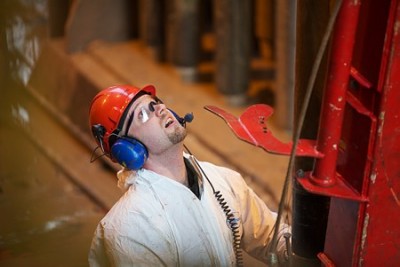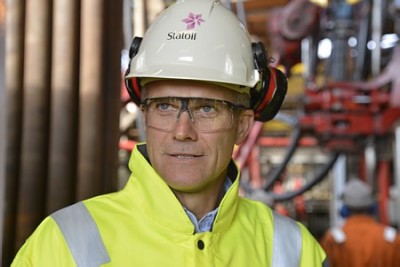While things keep looking up for Norway’s booming offshore oil and gas industry, debate is also rising over what that means for mainland industry and the environment. Statoil boss Helge Lund was among those scoffing at the debate, as Norway’s financial elite gathered at a prestigious meeting in Oslo this week.

“In other countries, a discussion about how we should restrict the (oil and gas) activity would sound like a joke,” said Lund at the gathering at Holmenkollen Park Hotel hosted by Oslo brokerage firm Pareto.
Newspaper Dagens Næringsliv (DN) reported Thursday that Lund sees no reason for anyone, especially economists, politicians or other industry executives, to urge moderation or slow down the pace of offshore development.
“The critics think Norway’s blossoming oil and gas sector puts negative pressure on the Norwegian economy and hurts other branches,” Lund said. “Some even think that the authorities should step in and reduce activity on the Norwegian continental shelf.” He clearly rejects any such proposals, arguing they would “damage” the reputation of the North Sea and discourage investment.

“If the critics get what they want, the Norwegian shelf will lose its competitiveness and the entire development of Norway’s oil industry, with hundreds of thousands of jobs at stake, would be put at risk,” Lund said. He’s disappointed that Norwegians in general don’t show more enthusiasm for their oil industry, arguing that “it’s something we should defend and develop, not reduce or expose to attack.”
Oil Minister Ola Borten Moe of the embattled Center Party and Prime Minister Jens Stoltenberg of the ruling Labour Party agree, with Moe known as a bullish oil minister delighted by the record international interest in Norway’s offshore fields, not least in the far northern areas. He reported last week how 47 companies have applied for exploration rights in mature areas of the North Sea, up from 43 last year. A string of recent discoveries has fueled the interest, while there also have been more reports of possible new discoveries in the Barents Sea as well. Companies like Wintershall of Germany have announced plans to hire 80 more employees in Norway after record results from their own offshore activity. Wintershall now has more than 40 licenses in Norway.
Defending the industry
Stoltenberg has been busy defending Norway’s oil industry as well. “We should be happy that things are going well in the oil industry,” Stoltenberg told DN during a visit to the country’s oil capital of Stavanger over the weekend to study oil field security after last year’s terrorist attacks. Stoltenberg noted that not too long ago, “everyone was worried that the sun was setting on the industry” and that not enough was being done to preserve it.
Neither Stoltenberg nor Statoil’s boss for Norwegian operations, Øystein Michelsen, can understand the concerns over brisk oil activity and its consequences on the rest of the economy. Stoltenberg said his government (running for re-election next year) has worked to boost activity, not limit it.
Both Stoltenberg and Moe, however, face opposition from within their own ranks. Several Center Party politicians complained just last week that their rural mainland districts were losing workers to the oil industry, and that the activity was also driving up both labour costs and other costs for mainland enterprises. Some aired environmental concerns as well and claimed that all the big, new discoveries of oil should lead to reduced need for exploration, not more.
Eskil Pedersen, head of the Labour Party’s youth group AUF, thinks his own party leader and prime minister needs to take a more critical view of the industry. He reminded Stoltenberg of the environmental challenges tied to oil exploration and production.
“It’s not true that we have to quickly pump up the most oil possible,” Pedersen told DN. “The oil and gas won’t disappear. We shouldn’t look only at what’s best for the economy, but also what’s most responsible regarding the environment and the climate.”
‘Let the good times roll’
Lund of Statoil conceded that “there’s no doubt” the high level of investment in the oil industry is boosting costs and creating capacity problems, “but that’s a global problem that we can’t hinder in little Norway. This is a global industry and a long-term industry. If we put limits on activity now, what do we know about how the economy will look when they take effect? Norway can’t isolate itself.”
Others at the Pareto gathering, including professor Torger Reve at business school BI, think it’s fine if the oil industry presses out forestry or other Norwegian industries that are no longer internationally competitive. Reve is not a big fan of Stoltenberg’s initiative this week to compensate mainland industry for higher CO2 taxes.
Still others welcome all the investment in the oil business and simply seem to hope the party will continue. “I hope it will last a good while, because it’s a real bull market,” said Thomas Wilhelmsen of the younger generation of the Wilhelmsen shipping family and who recently took over as chief executive of their business. He noted that the shipping lines are hurt by high oil prices, but they’ve invested in offshore businesses as well.
Views and News from Norway/Nina Berglund
Please support our news service. Readers in Norway can use our donor account. Our international readers can click on our “Donate” button:

